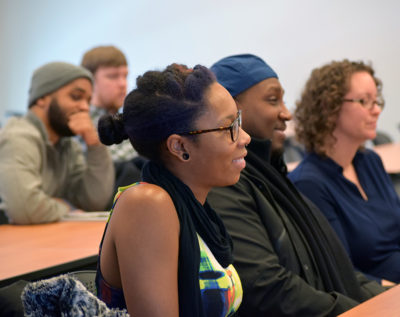Cornell Brings its Best to Science Communication Panel

Panelists shared important nuggets of advice at the September 15 Science Communication Careers panel discussion. by Tyran Grillo
- Those in the sciences must have their thoughts organized and their language carefully chosen in preparation for any sort of media presentation
- Scientists must be discerning about which truths they openly share
- Science communication is something you do by learning
- Understand your audience, and be able to speak about your work cogently and succinctly
- Never turn down an opportunity to speak publicly about your work
- Ask: does your work, and your presentation of it, pass the ‘who cares’ test?
Testimonials
“1. Importantly, the panel gave hope to the grad students who weren’t quite sure they wanted [to] have careers in academics. 2. The speakers made it clear how important our roles are as science communicators. 3. Many of the insights given to the audience by the speakers gave subtle steps necessary to progress into careers in science communication.” –Wisler Charles, Ph.D. candidate, biomedical and biological sciences
Careers Beyond Academia/BEST “has a very important role in higher education: bridging education with a career. The traditional Ph.D. or postdoc training is far removed from the world beyond academia, yet most of us will end up being thrown into that world. Even if that is our goal, there are few formal avenues for us to properly prepare ourselves.
[This] was a great introduction to how [Careers Beyond Academia/BEST] is trying to fill that void and give graduate students and postdocs opportunities to learn skills that will carry them beyond academia. Monday’s panel showed how a scientific background can be used in a communications-based career like public relations. More broadly, though, the panelists emphasized the importance of honing communication skills for… any situation where you must communicate technical ideas to a lay audience. In addition to continuing similar panels for other career paths, [Careers Beyond Academia/BEST] is developing workshops and coursework to teach academics important career skills. Moreover, [Careers Beyond Academia/BEST] is becoming the central organization on campus to collect and distribute all these and other campus resources that can help grad students and postdocs find and prepare for their future careers.” –Lena Bartell, Ph.D. candidate, applied engineering and physics


